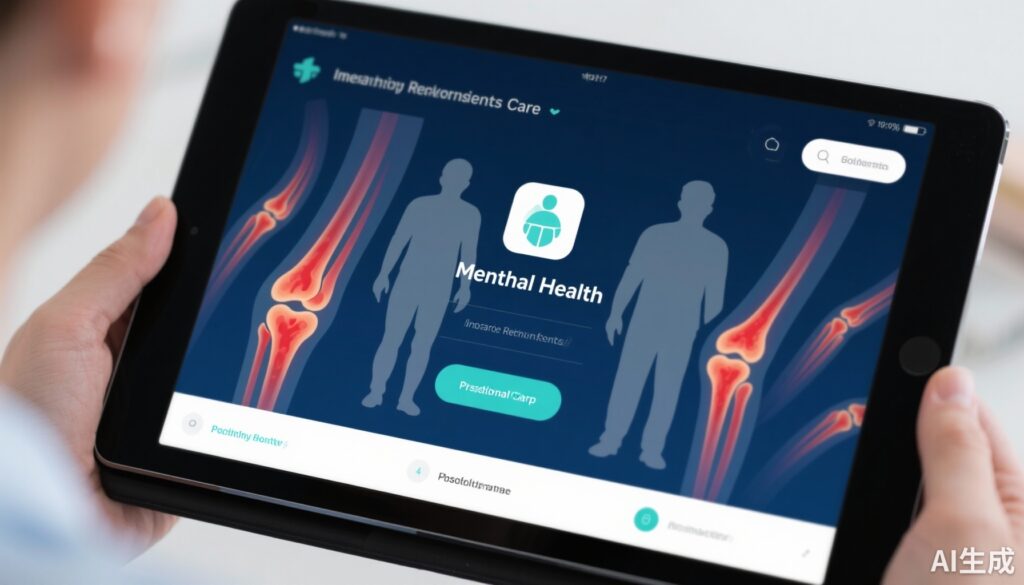Highlight
Patients with inflammatory rheumatic diseases (IRDs) often suffer from psychological distress, yet access to psychological support remains limited. This pilot randomized clinical trial evaluated a self-guided digital psychological intervention tailored for IRD patients across Germany, revealing significant improvements in psychological distress and quality of life compared to usual care. The findings underscore the potential of scalable, accessible digital health solutions to meet unmet mental health needs in rheumatology.
Study Background and Disease Burden
Inflammatory rheumatic diseases such as rheumatoid arthritis (RA), psoriatic arthritis (PsA), and systemic lupus erythematosus (SLE) are chronic autoimmune conditions characterized by systemic inflammation causing joint damage, pain, disability, and reduced quality of life. Apart from physical manifestations, patients with IRDs frequently experience psychological distress including anxiety and depression, which negatively impact disease outcomes and overall wellbeing. However, psychological support services are often inaccessible due to cost, geographic limitations, stigma, or lack of specialized mental health providers within rheumatology care.
Given the increasing penetration of digital technologies, digital psychological interventions have emerged as promising tools to fill this critical gap. These interventions can offer scalable, confidential, and flexible support for patients who experience psychological distress concurrently with their chronic physical illness. Yet, data on their effectiveness in IRD populations remain scarce. This context motivated the current pilot randomized clinical trial to evaluate a self-guided digital psychological intervention focused on improving mental health and quality of life in individuals diagnosed with IRDs.
Study Design
This was a pilot randomized clinical trial conducted in Germany, recruiting patients aged 18 years or older diagnosed with RA, PsA, or SLE who reported psychological distress and reduced quality of life. Recruitment occurred between February 22 and June 4, 2024. A total of 102 participants were randomized into two groups: 52 to the intervention arm receiving a self-guided digital psychological program, and 50 to a treatment-as-usual control condition.
The digital intervention was designed for self-administration, enabling patients to engage at their convenience, addressing psychological distress through evidence-based psychological techniques. The study’s primary endpoints were changes from baseline to three months in psychological distress measured by the German version of the Hospital Anxiety and Depression Scale (HADS) and quality of life assessed by the Assessment of Quality of Life–8 Dimensions (AQoL-8D).
Secondary outcomes included changes in self-efficacy, health literacy, perceived stress, functional impairment, as well as specific measures of depression and anxiety. Safety was monitored by reporting adverse events related to the intervention.
Key Findings
The 102 participants had a mean age of 47.2 years (SD 12.9), predominantly female (90.2%). Baseline measures showed established psychological distress and compromised quality of life across both groups.
At the 3-month follow-up, the intervention group experienced a significantly greater reduction in psychological distress compared to controls, with a least-squares mean difference of -3.60 points (SE 1.07; 95% CI, -5.73 to -1.47; P < .001), corresponding to a large effect size (Cohen d = -0.71). This indicates meaningful alleviation of anxiety and depression symptoms in the digital intervention group.
Quality of life also improved more in the intervention group with a least-squares mean difference of 0.04 (SE 0.02; 95% CI, 0.00 to 0.09; P = .047), yielding a moderate effect size (Cohen d = 0.49). Clinically meaningful improvement — defined by established thresholds — was observed in 59.2% of intervention participants vs. 34.0% controls for psychological distress (P = .02), and 55.1% vs. 32.0% for quality of life (P = .03).
Secondary outcomes trended towards significant improvement in the intervention group, including increased self-efficacy, improved health literacy, and reduced perceived stress. Importantly, there was no significant effect on functional impairment, and no intervention-related adverse events were reported, supporting both the safety and tolerability of the digital intervention.
This pattern indicates that digital psychological intervention can effectively reduce mental health symptoms and enhance perceived wellbeing in patients with IRDs over a relatively short timeframe.
Expert Commentary
This trial offers promising evidence for incorporating digital psychological support in the management of IRDs, a patient population often underserved in mental health care. The robust methodological design, including randomization, validated outcome measures, and a control group, strengthens internal validity. The substantial effect sizes on psychological distress mirror outcomes from similar digital mental health interventions in other chronic illness contexts.
Nevertheless, as a pilot study, limitations include the relatively small sample size and short follow-up duration. Future larger-scale studies will help consolidate findings and assess sustainability of effects, including impacts on physical disease parameters and healthcare utilization.
Moreover, the predominance of female participants limits generalizability somewhat, and replicating results across diverse sociodemographic and cultural settings is warranted. Integration with clinical care pathways and patient engagement strategies will be critical for practical implementation.
Biologically, psychological distress in IRDs may exacerbate inflammatory pathways and symptom burden, suggesting that psychological interventions potentially have downstream immunological benefits, an avenue for future mechanistic research.
Conclusion
This pilot randomized clinical trial establishes the effectiveness and safety of a self-guided digital psychological intervention in adults with inflammatory rheumatic diseases experiencing psychological distress. The intervention yielded significant improvements in mental health symptoms and quality of life, demonstrating its promise as a scalable strategy to address the prevalent and often untreated psychological burden in IRDs.
By alleviating distress and enhancing coping resources, such digital tools can complement conventional medical therapies, contributing to holistic patient-centered rheumatology care. Ongoing research will refine intervention content, delivery modalities, and clinical integration to maximize benefit and accessibility.
Ultimately, digital psychological interventions hold significant potential to transform mental health support for patients living with chronic inflammatory diseases.
References
1. Knitza J, Kraus J, Krusche M, et al. Digital Psychological Intervention for Inflammatory Rheumatic Diseases: A Pilot Randomized Clinical Trial. JAMA Netw Open. 2025;8(9):e2529892. doi:10.1001/jamanetworkopen.2025.29892
2. Matcham F, Rayner L, Steer S, Hotopf M. The prevalence of depression in rheumatoid arthritis: a systematic review and meta-analysis. Rheumatology (Oxford). 2013 Dec;52(12):2136-2148. doi: 10.1093/rheumatology/ket169
3. de Thurah A, Hegelund ACS, Stengaard-Pedersen K. Patient-reported outcomes of psychological distress in patients with rheumatic diseases: a systematic review. Arthritis Care Res (Hoboken). 2019 Jan;71(1):144-155. doi:10.1002/acr.23533
4. Andersson G, Titov N. Advantages and limitations of Internet-based interventions for common mental disorders. World Psychiatry. 2014 Feb;13(1):4-11. doi:10.1002/wps.20083
5. Neumann DL, Watt S, Dibben MR, Wheaton M. Patient perspectives on internet-delivered psychological treatments for chronic illness: A qualitative synthesis. J Telemed Telecare. 2021 Mar;27(2):72-83. doi:10.1177/1357633X19896320



